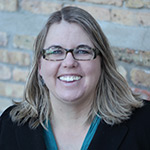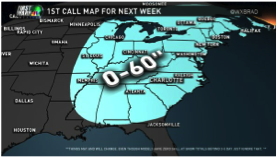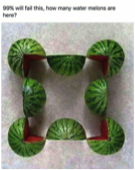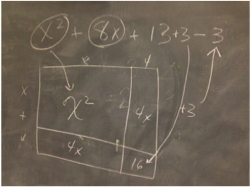MCTM’s Mission Statement: MEANINGFUL

Sara Van Der Werf
Teacher, Minneapolis South High School
MCTM President
 Pi Day 2016 is upon us. Are you ready? Last year my friend, Sonja Krasean, and I invited anyone who would listen to join us on a 3.14 mile walk around Lake Calhoun on Saturday, 3.14.15 at 9:26 am – aka The Pi Day of the Century. Over 200 people (I am pretty sure there were exactly 314 people) joined us in a crazy mathy celebration of Pi. We had a Pi Day band playing a song written using the digits of pi. We had a Pi Day count down. We noted that the ratio of Lake Calhoun to its diameter was approximately pi. We even had the media present to capture this all. In 2016 Pi day falls on a Monday. Each year I wonder if I should give up precious classroom time to celebrate this day. I wonder why pi gets its own day. Is pi the most meaningful thing in math we should be celebrating? If I do celebrate pi day with my students I wonder what I can do on this day that is mathematically meaningful. Let’s be real – memorizing digits of pi is about as useless as learning to play the recorder (though a bit less annoying). While eating pie may be fun, if I do give in and celebrate am I giving up a precious day at the cost of something more meaningful?
Pi Day 2016 is upon us. Are you ready? Last year my friend, Sonja Krasean, and I invited anyone who would listen to join us on a 3.14 mile walk around Lake Calhoun on Saturday, 3.14.15 at 9:26 am – aka The Pi Day of the Century. Over 200 people (I am pretty sure there were exactly 314 people) joined us in a crazy mathy celebration of Pi. We had a Pi Day band playing a song written using the digits of pi. We had a Pi Day count down. We noted that the ratio of Lake Calhoun to its diameter was approximately pi. We even had the media present to capture this all. In 2016 Pi day falls on a Monday. Each year I wonder if I should give up precious classroom time to celebrate this day. I wonder why pi gets its own day. Is pi the most meaningful thing in math we should be celebrating? If I do celebrate pi day with my students I wonder what I can do on this day that is mathematically meaningful. Let’s be real – memorizing digits of pi is about as useless as learning to play the recorder (though a bit less annoying). While eating pie may be fun, if I do give in and celebrate am I giving up a precious day at the cost of something more meaningful?
This article is part 5 of an 8 article series highlighting 8 words in the MCTM Mission Statement highlighting the word ‘MEANINGFUL‘. (Here are links to part 1: ‘PROFESSIONALS’, part 2: ‘PROMOTING’, part 3: ‘TEACHING’, part4: LEARNING). In my series of articles I hope to give insight into 8 of the words it contains and how they inform our practice. Please take a moment to reread our mission statement.

In preparation for this month’s article I looked up the definition of ‘Meaningful’ and found ‘having meaning’. So not helpful. My 2nd grade teacher told me I could not define a word with the word so I always get a bit annoyed as an adult when dictionaries do this. What I did find helpful were the synonyms connected with the word meaningful. Read the synonyms OUT LOUD with me (seriously, stop what you are doing and vocalize these next words) – SIGNIFICANT, RELEVANT, IMPORTANT, WORTHWHILE, DEEP. These words are helpful. Is the math I am teaching significant? Is what I do on my classroom relevant? Am I selecting tasks that are worthwhile? Is the math important? Is it deep? These are great questions for all of us to ponder.
NCTM’s Principals to Actions uses the word ‘meaningful’ over 50 times, usually to refer to ‘meaningful learning’. Though the word is used a lot, the meaning of the word seemed to require one to read and implement the entire text. In leiu of doing this (which you should do – because NCTM’s Principles to Action is amazing) I will give you some of the questions I use to assure I am making the math in my own classroom is meaningful. I now refer to these questions as my ‘Meaningful Litmus Tests’.
Meaningful Litmus Test #1-RELEVANT:
What will my students remember months/years after I have taught them? What will students go home and tell their parents about?
A couple of weeks ago my school had our winter parent conferences. Several parents mentioned to me that their students had talked a lot about some stories I had told them about my personal experiences with collge loans. We had been learning about exponential functions and logarithms so my colleague and I built a student project related to college loans. One goal of the project was to make students financially literate about the choices they would soon be making about their futures. Students were engaged and had lots of questions. The math we had just be learning about came alive as we compared loans with interest rates of 6% to those with interest rates of 17%. Months later my students remember a lot of math related to exponential functions and they remember my personal stories. I know learning is best when I find ways to connect the learning we are doing to my students lives. I also know learning is best when either throgh stories or some other method I connect learning to emotion. Student brains seem to remember matheamatics faster if it connected to a context. My students tend to tell others about what is happening in class through story or context. Next month my students will have choice in an end of the year math project related to social justice. A personal goal I have for next school year is to increase the amount of student choice in my courses. My goal will be always, how can I make the mathematics students are learning relevant to their lives
Meaningful Litmus Test #2-WORTHWHILE:
Does what I am doing in my classroom foster curiousity in my students?
 If I want my students to find the mathematics we are doing to be worthwhile, one easy way to do this is to spark their curiousity. If I can get them noticing and wondering about something, I often will have them for the connected mathematics. There are so many great tools for this in 2016. One of my favorite is twitter. The pictures shown are just two of many that I’ve downloaded from twitter this week and given to teachers I know could use them. The teacher I gave the weather map to teaches AP Stats and used it the next day in class to talk about
If I want my students to find the mathematics we are doing to be worthwhile, one easy way to do this is to spark their curiousity. If I can get them noticing and wondering about something, I often will have them for the connected mathematics. There are so many great tools for this in 2016. One of my favorite is twitter. The pictures shown are just two of many that I’ve downloaded from twitter this week and given to teachers I know could use them. The teacher I gave the weather map to teaches AP Stats and used it the next day in class to talk about  confidence intervals. The watermelons offer up so may possiblities for talking about parts and whole. There is no excuse to not have great photos that engage students curiousity in the mathematics. A second favorite for sparking curiousity are 3 act lessons. Have you used one yet? There are great 3 act lessons for grades K-5 and 6-12. (just click the previous links). Lastly, you have to – must –do it now – use DESMOS asap. If you want to make domain and range feel worthwhile, have students create a picture of their choice using parts of functions. Teachers who have done this report they have never had students who understood domain and range so thouroughly. If you want to see a few examples of pictures students have created, click HERE and HERE. So great.
confidence intervals. The watermelons offer up so may possiblities for talking about parts and whole. There is no excuse to not have great photos that engage students curiousity in the mathematics. A second favorite for sparking curiousity are 3 act lessons. Have you used one yet? There are great 3 act lessons for grades K-5 and 6-12. (just click the previous links). Lastly, you have to – must –do it now – use DESMOS asap. If you want to make domain and range feel worthwhile, have students create a picture of their choice using parts of functions. Teachers who have done this report they have never had students who understood domain and range so thouroughly. If you want to see a few examples of pictures students have created, click HERE and HERE. So great.
Meaningful Litmus Test #3-DEEP:
Does it make my students think?
Web deigners have the opposite litmus test as us math teachers do. As they design websites their goal is to design something that does not require the user to think. The usability of their sites depend on little thinking. The opposite is true in our classrooms. Meaningful mathematics is math where students are engaged in productive struggle and are making meaningful connections between concepts and representations. I want my students to be addictided to that feeling of being puzzled only to be rewarded with the carthsis that comes from unpuzzling something that seemed difficult. Deep learning comes from students trying to make sense of matheamtical concepts.
Meaningful Litmus Test #4-SIGNIFICANT:
What can I learn from my peers about the mathematics I am teaching?
One of the things that has made a significant impact on my teaching over the years has been having ongoing conversations with my math teaching colleagues. Usually these conversations are not part of some official meeting. Most conversations take  place over lunch or in one of our classrooms after school. Most conversations are 5-15 minutes in length. A couple of weeks ago I was wasting time catching up with math teacher about our lives. He teaches the course that comes after mine so I often ask him some form of the following question: “What do you hope the students I send you next year know about _______?”. On this evening I was asking about the different forms of a quadratic function. He then grabbed a piece of chalk and drew a representation he uses so students understand why they are ‘completing the square’. Had I not talked to him for these 5 minutes, I never would have thought of this on my own. In 5 minutes he drew me a picture and strengthens the concept I was teaching to students. To make significant change in our teaching that results in meaningful learning for students, we need to be talking to other math teachers. Not because someone is making us do this. We need to talk to them so we can improve our practice. One habit I started long ago in teaching was making sure I ate lunch everyday with teachers. I also make myself leave my classroom, even if I feel like I don’t have time, to go into other teachers classrooms and connect. If I want significant learning for students I don’t have time not to connect with other teachers.
place over lunch or in one of our classrooms after school. Most conversations are 5-15 minutes in length. A couple of weeks ago I was wasting time catching up with math teacher about our lives. He teaches the course that comes after mine so I often ask him some form of the following question: “What do you hope the students I send you next year know about _______?”. On this evening I was asking about the different forms of a quadratic function. He then grabbed a piece of chalk and drew a representation he uses so students understand why they are ‘completing the square’. Had I not talked to him for these 5 minutes, I never would have thought of this on my own. In 5 minutes he drew me a picture and strengthens the concept I was teaching to students. To make significant change in our teaching that results in meaningful learning for students, we need to be talking to other math teachers. Not because someone is making us do this. We need to talk to them so we can improve our practice. One habit I started long ago in teaching was making sure I ate lunch everyday with teachers. I also make myself leave my classroom, even if I feel like I don’t have time, to go into other teachers classrooms and connect. If I want significant learning for students I don’t have time not to connect with other teachers.
Meaningful Litmus Test #5-IMPORTANT:
What do I hope my students can do at the end of this unit?
Meaningful means finding the big concepts, the important concepts that I have to get right when I teach. If I don’t begin by thinking about the big picture I find myself falling into old habits too many of us spend time in – namely teaching isolated skills that students cannot put together into a cohesive math concept. My students might even do well on a test of skills I taught them, but a month later they remember nothing. This is not learning. I need to figure out the big important things I want ALL students to come away with BEFORE I begin teaching. To do this I ask myself, ‘At the end of this unit what do I hope students can do?”. For example, currently I am in a unit on solving systems of equations and inequalities, including using matrices. I could just start teaching the unit and teaching the variety of methods to solve systems, test on these method and move on to the next unit feeling like things are OK. What I really think is important for students to know and be able to do months and years from now is to be skilled at lots of different methods to solve a system of equations and to more importantly know which method will be most efficient. Students will have the ability to on their own select a method that makes sense with the context and information given. With this big goal in mind, I teach very differently. If I want students to decide the method, I make sure I don’t decide for them and tell them what to do. Lastly, if I am teaching important/meaningful math I want to make sure I am not teaching methods and rules that expire after my course (check out NCTM’s list HERE – there are others out there). For example, I don’t say “you can’t take the square root of a negative number”. If you have not read ‘Nix the Tricks’ yet – do it today. It is important to do to make sure you are teaching meaningful mathematics.
 I love connecting with math teachers, especially those of you from Minnesota. You can find me on Twitter @saravdwerf or Email me at sarav@mpls.k12.mn.us or check out my Math Teaching blog at saravanderwerf.com I end with a quote from first lady, Michelle Obama in which she used the word ‘meaningful’.
I love connecting with math teachers, especially those of you from Minnesota. You can find me on Twitter @saravdwerf or Email me at sarav@mpls.k12.mn.us or check out my Math Teaching blog at saravanderwerf.com I end with a quote from first lady, Michelle Obama in which she used the word ‘meaningful’.
Have a great Pi Day! Make sure that whatever you do it is meaningful.
